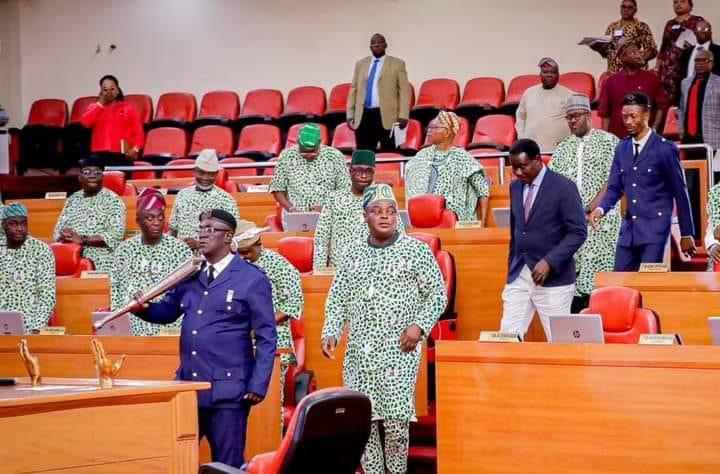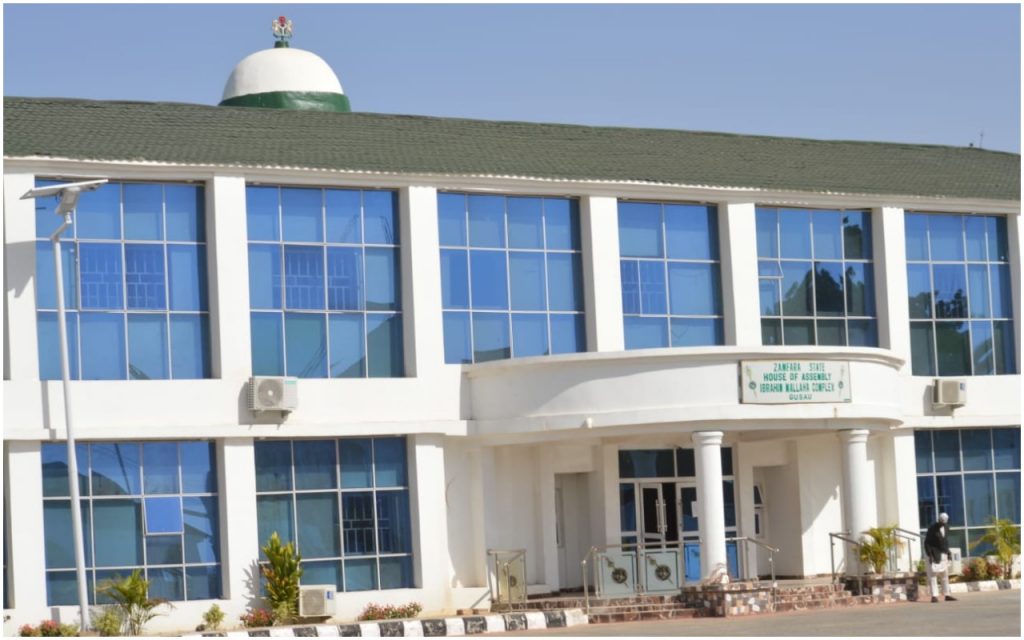Politics
Don’t Be Ignorant Of The Law, Lagos Assembly Hits Back At Suspended Chairman, Lawyer
Published
6 months agoon
By
Ekwutos Blog
– says law does not recognise sentiment, emotions
The Lagos State House of Assembly has asked suspended chairman of Alimosho Local Government Area, Jelili Sulaimon, and his lawyer, Dr. Abdul Mahmud, to recognise the place of law rather than sentiments and emotions as guiding principles of legislative practices in Lagos State.
The advice by the Assembly on Tuesday was in response to the purported reaction of the duo to the suspension of the council chairman by the House on Monday at plenary.
The House, in the reaction signed by Hon. Stephen Ogundipe,
chairman, Committee on Information, Strategy and Security, further advised Jelili against ascribing self-made meanings to the laws empowering the lawmakers act where necessary in the interest of the people.
Read the full reaction below:
JELILI SULAIMAN’S SUSPENSION BACKED BY LAW
The attention of the Lagos State House of Assembly has been drawn to a statement supposedly signed by Dr. Abdul Mahmud, counsel to the embattled Alimosho local government chairman, Mr. Jelili Sulaimon, claiming to condemn the unanimous agreement of the Assembly to suspend his client on Monday, October 7, 2024.
Beyond the sensational rhetoric and half-baked details in the statement that is replete with emotions rather than deep-thoughts, it is pertinent to break down the real situation and puncture arguments as to the powers of the House to suspend Mr. Jelili.
In his race to the public to ‘garner’ sentiments, Jelili’s lawyer forgot to remember that there are no local government areas that created themselves. In other words, the creation of a local government follows strict processes of the law and Section 7 of the 1999 Constitution of Nigeria (as amended) creates the path to knowledge about this.
“The system of local government by democratically elected local government councils is under this Constitution guaranteed; and accordingly, the Government of every State shall, subject to Section 8 of this Constitution, ensure their existence under a Law which provides for the establishment, structure, composition, finance and functions of such councils.” Does this answer a question from the arguments of Jelili’s lawyer as to who has the power to create laws that regulate the activities of local government councils and their administration?
For better understanding, that section provides for the existence of: democratically elected system of Local Government to be guaranteed by a law of the State House of Assembly.
The same section provides that the House of Assembly is required to make provisions for statutory allocation of public revenue to Local Government Councils in a State. Section 8(3) highlights the procedure to be undertaken by a State House of Assembly in the creation of a new Local Government Area(s) in a State while Section 8(4) highlights the procedure to be undertaken by a State House of Assembly, through law, in the boundary adjustment of existing Local Government Areas.
Now, Section 162 (8) of the Constitution stipulates that a Law of the State House of Assembly shall provide for the distribution of monies standing to the credit of Local Government councils in a State.
Maybe we should remind him, his client and those travelling with him that Section 128 of the same Constitution further gives clarity to the powers of the House of Assembly.
“Subject to the provisions of this Constitution, a House of Assembly shall have power
by resolution published in its journal or in the
office Gazette of the Government of the State
to direct or cause to be directed an inquiry or
investigation into –
(a) any matter or thing with respect to which it
has power to make laws.
Here and based on the above constitutional provision, we are moved to ask again: who is legally guaranteed to make the law that creates the running of the local government? It is definitely not the National Assembly which is granted the constitutional powers to create states and not local governments.
This brings us to the Lagos State Local Government Administration Law (as amended) upon which the creation, administration and related activities of the local government system of Lagos State are based.
For better public information and effective knowledge, Section 24(a) of the amended law gives powers to the Lagos State House of Assembly to pass a resolution for the removal or suspension of any chairman, vice chairman, or official of any local government area (LGA) or local council development area (LCDA) after conducting an investigation. It states further that all that is needed for this resolution is a simple majority of the Assembly members. This emphasis is further highlighted in Section 5 of the law.
The amendment aims to ensure accountability and maintain order within the local government structure in Lagos State.
With this level of enlightenment as to the position of the laws guiding the administration of local government councils, it is further important to avoid misinformation or misrepresentation of the recent Supreme Court judgement concerning local governments in Nigeria. There is a marked difference between financial autonomy (upon which the lawyer’s argument rests) and administrative powers of the House. The rush to churn out a defence armed, albeit, with inferior understanding of the Supreme Court judgement does not give a sufficient case against the action of the House of Assembly.
The Local Government Administration law from which the council chairman and other elected officials of the local government system derive their powers is a product of the House of Assembly. The office of the Auditor-General for Local Governments that monitors the financial activities of this third tier of government is created by the law made by the Lagos State House of Assembly.
The Local Government Service Commission which handles issues relating to the officials of local governments is a creation of the House of Assembly. The Lagos State Independent Electoral Commission (LASIEC) that conducts elections into elective offices at the local government level is a creation of the House of Assembly. Therefore, jettisoning these facts will amount to a poor knowledge of the legislature. If you say the Lagos State House of Assembly does not have the power over local governments, it means all these laws created by the House should not be in place. If the laws should not be in place, then why would local governments exist?
We learnt that in a bid to protect the chairman, the councillors of the Alimosho Local Government Area hurriedly suspended the Vice Chairman, Akinpelu Johnson. To show how laughable this is, it is good to note that the law guiding them does not have a provision for suspension. The Local Government Administration law gives them the opportunity to remove a chairman or vice chairman but this also comes with a process. Thus, the suspension of Johnson is simply invalid. It is therefore necessary to remind the council leader that he can also be removed in line with the Local Government Administration law of Lagos State. If he does not know this, then, it is a pity.
For the few trying to juxtapose the functions of the National Assembly with those of the House of Assembly in this case, they should take a chill pill and request to be tutored. The National Assembly cannot interfere with the runnings of a State. It is not a part of its duty. On the other hand, the constitution grants the State House of Assembly powers over the local governments.
It is to be noted that this is not the first time the Lagos State House of Assembly would be suspending the same council chairman. In May 2021, he was suspended with two others by the House for their total disregard for the local government guidelines created by the State Legislature.
While we urge against mawkishness, we would also like to task residents of the council and members of the public not to allow themselves be swayed by positions and opinions that are opposite the law in this regard.
Hon. Stephen Ogundipe
Chairman, Committee on Information
Lagos State House of Assembly.
You may like
Nigerian Govt urges Ethiopia to expedite action on exchange of sentenced persons


NAF strikes several terrorists’ enclaves in Sambisa, Southern Tumbus


STATEMENT ON PRESIDENT TINUBU’S RETURN TO NIGERIA


Zamfara Assembly reinstates suspended member, Basko after formal apology


Court frees boy who stood before Peter Obi’s convoy months after detention


Na to break una phone” Nkechi Blessing Sunday warns people who try to take unflattering photos of her with their cheap phones
Politics
Zamfara Assembly reinstates suspended member, Basko after formal apology
Published
5 hours agoon
April 17, 2025By
Ekwutos Blog
Zamfara State House of Assembly, at its plenary session on Wenesday, officially reinstated the suspended member representing Talata Mafara North Constituency, Hon. Shamsudeen Hassan Basko, following the submission and acceptance of his written letter of apology to the House.
This was contained in a statement issued by the chief press secretary of the House Speaker, Comrade Bello Madaro and made available to newsmen in Gusau, the State capital.
The Speaker of the House, Rt. Hon. Bilyaminu Ismail Moriki, while reading the contents of the apology letter during plenary, sought the collective consent of the members present, who unanimously resolved in favour of lifting the suspension placed on Hon. Basko.
The Speaker emphasized that the House remains open to receiving similar expressions of contrition from the remaining seven suspended members, to facilitate their reinstatement and foster unity in the legislative arm.
Several members contributed to the debate on the floor in support of the reinstatement, including Hon. Nura Dahiru Sabon Birni Birnin Magaji, Hon. Kabiru Mikailu Dangulbi (Maru South), and Hon. Rilwanu Marafa Nagambo Anka.
They collectively welcomed Hon. Basko’s return to the House and encouraged the other suspended colleagues to emulate the gesture in the interest of legislative harmony and the socio-political development of their respective constituencies and the state at large.
In his brief remark, Hon. Shamsudeen Basko expressed gratitude to the House for the opportunity to return and pledged his commitment to the legislative ethics and discipline of the Assembly.
He further assured the Honourable members of his resolve to distance himself from any group or influence that seeks to undermine the integrity and authority of the House.
Recall that on 26th February 2024, the House, through a motion moved by the Majority Leader, Hon. Bello Mazawaje, PDP Tsafe East, suspended eight members for acts deemed to be in violation of the Standing Orders of the Assembly (Order 10, Rule 9).
The motion cited actions, including forceful entry into the offices of the Clerk and the Sergeant-at-Arms, unlawful sitting, obstruction of legislative processes, and conduct unbecoming of Honourable Members, as grounds for the disciplinary measure.
Politics
Trump may shut down US embassies in Africa, others— Report
Published
8 hours agoon
April 17, 2025By
Ekwutos Blog
The Donald Trump administration could shut down nearly 30 United States embassies and consulates across the world, including some in Africa, as part of a his reforms to cut cost and reduce the country’s diplomatic foreign presence.
A CNN report on Wednesday, citing an internal US State Department document, states that the embassies in the Republic of Congo, Central African Republic, Lesotho, and South Sudan are among those proposed for closure, the Punch had reported.
A US consulate in South Africa may also be shut down.
“The document recommends closing 10 embassies and 17 consulates. Many of the posts are in Europe and Africa, though they also include locations in Asia and the Caribbean.
These include embassies in Malta, Luxembourg, Lesotho, the Republic of Congo, the Central African Republic, and South Sudan.
According to the report,“The list also includes five consulates in France, two in Germany, two in Bosnia and Herzegovina, one in the United Kingdom, one in South Africa, and one in South Korea,”
The proposal is part of a broader effort by the Trump-led government, reportedly influenced by the Elon Musk-backed Department of Government Efficiency to drastically reduce the size and spending of federal agencies, including the State Department.
The internal document also suggests reducing the US presence in countries such as Somalia and Iraq, which have been central to America’s counterterrorism efforts.
There has been no official confirmation that Secretary of State Marco Rubio has approved the proposal, and a spokesperson for the department declined to comment on the leaked document.
Politics
Otti expresses concern over stalled works on Nigeria Railways Umuahia-Enugu section
Published
9 hours agoon
April 17, 2025By
Ekwutos Blog
Abia State Governor, Alex Otti, has expressed concerns that the progress of work has stalled on the Umuahia to Enugu section of the railway corridor.
The projects, he said, were scheduled for completion by the first quarter of last year but have remained stalled.
Otti raised the concern during a meeting with the new Managing Director of the Nigeria Railway Corporation, NRC, Kayode Opeifa, and the NRC team.
He expressed confidence that, under the new Managing Director, the trajectory of NRC work would bring the much-needed speed and quality to the railway projects across the nation, especially the South-East corridor.
Governor Otti, who described transportation as a key sector for economic development and national growth, reiterated his administration’s commitment to transforming the transport sector, which includes ongoing efforts to modernize the transport system in the state.
“The speed with which the other parts of the corridor were executed and the speed at which the execution is happening right now are different, but I am sure you’ll change the trajectory very soon,” Otti said.
On concerns raised about the security of NRC assets in Aba, Governor Otti assured that he would look into the issue and provide the necessary support, including logistics, emphasizing that his government does not discriminate between federal and state projects.
Speaking earlier, the Managing Director of the Nigeria Railway Corporation, Kayode Opeifa, disclosed that the meeting was to deepen discussions and plans on how best to revive the Aba-Umuaahia rail line, adding that their mandate is to ensure that all major cities in the South-East are connected to the national rail line.
Nigerian Govt urges Ethiopia to expedite action on exchange of sentenced persons

NAF strikes several terrorists’ enclaves in Sambisa, Southern Tumbus

STATEMENT ON PRESIDENT TINUBU’S RETURN TO NIGERIA
Trending

 Trending6 months ago
Trending6 months agoNYA demands release of ‘abducted’ Imo chairman, preaches good governance
- Business6 months ago
US court acquits Air Peace boss, slams Mayfield $4000 fine

 Politics6 months ago
Politics6 months agoMexico’s new president causes concern just weeks before the US elections
- Entertainment6 months ago
Bobrisky transferred from Immigration to FCID, spends night behind bars
- Entertainment6 months ago
Bobrisky falls ill in police custody, rushed to hospital

 Politics6 months ago
Politics6 months agoRussia bans imports of agro-products from Kazakhstan after refusal to join BRICS

 Politics6 months ago
Politics6 months agoPutin invites 20 world leaders
- Politics1 year ago
Nigerian Senate passes Bill seeking the establishment of the South East Development Commission.

